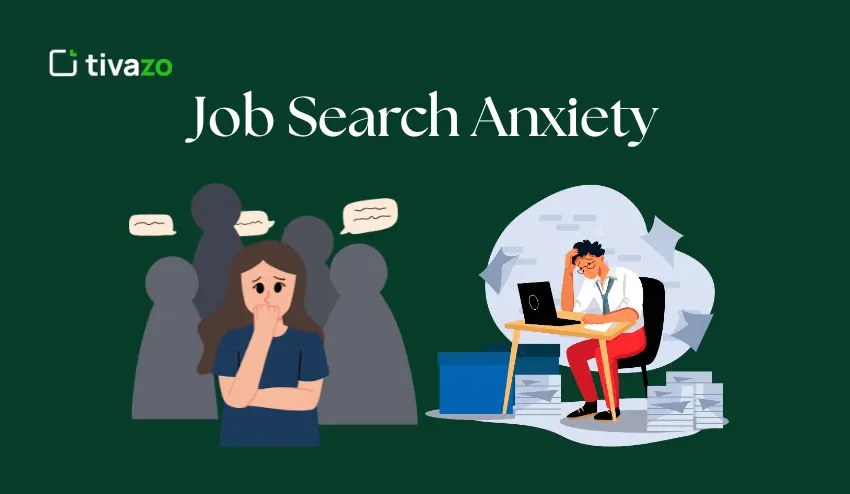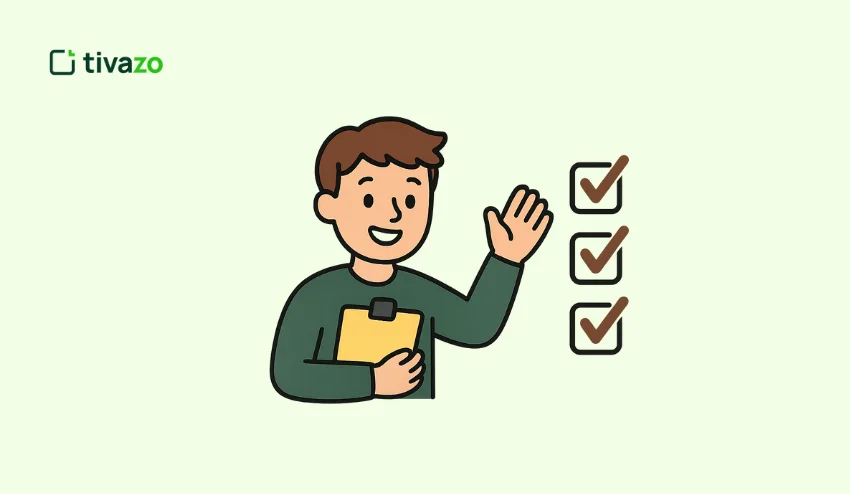The endless applications, long silences of recruiters, and endless second-guessing, job hunting can feel more of an emotional rollercoaster rather than a career step. Each application, interview, and rejection can be a strain. Job search anxiety is what many people feel when they are restless before clicking the apply button or stressed when they are waiting to hear back from a recruiter.
This kind of anxiety is more prevalent than most job seekers imagine. The need to secure the right job, the competition of hundreds of other applicants, and the need to maintain your finances stable all combine to form an ideal storm of stress. Otherwise, it can suck your confidence and make the process even more difficult.
In this post, we will explain what job search anxiety is, the symptoms to look out for, the causes, and, most importantly, how to deal with it. You will end up with practical tips to remain calm, confident, and in control during your job search.
What is Job Search Anxiety?
Job search anxiety is the stress, worry, and self-doubt experienced by people in seeking a job. It is usually a result of the unpredictability of the job search process, such as the lack of knowledge on when you would receive a response, how many applications you would have to submit, or whether you would be deemed adequate for the position.
At its essence, job search anxiety is more than being nervous. It can influence the way you approach interviews, the way you write your applications, and even your drive to continue. People refer to it as being stuck or overwhelmed in the search.
The key causes are:
- Rejection or silence on the part of employers – multiple applications without any reply.
- High competition – the awareness that dozens or hundreds of other people are competing in the same position.
- Financial stress – the fear of bills or other obligations when unemployed
- Perfectionism- worrying about every word in a resume or cover letter.
The key to managing job search anxiety is to understand what it is and why it occurs in the first place. When you are able to name the feeling, it is easier to take control.
Job Search Anxiety Sources
Job search anxiety does not come out of the blue. It normally accumulates as a combination of external demands and internal expectations. Being aware of the root causes can assist you to address them one at a time
These are the most typical causes of job search anxiety:
- Uncertainty of the recruitment process – The uncertainty of the time of the process and what employers are seeking.
- Repeated rejection- Hearing nothing back or getting a no after several applications can be painful to confidence
- Financial strain- The burden of bills, student loans, or family obligations increases the burden of the search.
- Comparison to others-When you see other people getting jobs fast, you feel like you are lagging behind.
- No control over it -You can control how you apply but not how recruiters respond. The inability to control that is the source of stress.
- Perfectionism and self-doubt Perfectionism and self-doubt can be very stressful.
By figuring out which of these causes impacts you the most, you will be able to begin working on ways to minimize the stress and keep your eye on the bigger picture.
Signs of Job Search Anxiety
It’s normal to feel nervous during a job search, but anxiety goes deeper than a few butterflies. Recognizing the signs eIt is natural to experience some anxiety in a job search but anxiety is more than a few butterflies. Being aware of the signs early enough enables you to act before stress takes control of you
The most common symptoms of job search anxiety are:
- Overthinking applications – Taking hours to fiddle with each word of your resume or cover letter.
- Avoidance – Putting off applications or missing opportunities to network.
- Physical symptoms- Difficulty in sleeping, headaches or tension when thinking of job hunting.
- Negative self-talk – You are always doubting your abilities or that you will be rejected.
- Mood changes – Feeling irritable or unmotivated or unusually down during the search.
- Obsessive checking-Checking your inbox or job boards several times a day to see if there is any update.
And, you are not alone if these signs are familiar to you. They are normal reactions to an unknown process, but they do not have to be what characterizes your job search.
Why Job Search Anxiety Happens
Job hunting is not all about résumés and making a good impression on interviews. It is also about uncertainty, and that is what causes anxiety. These are the most common triggers:
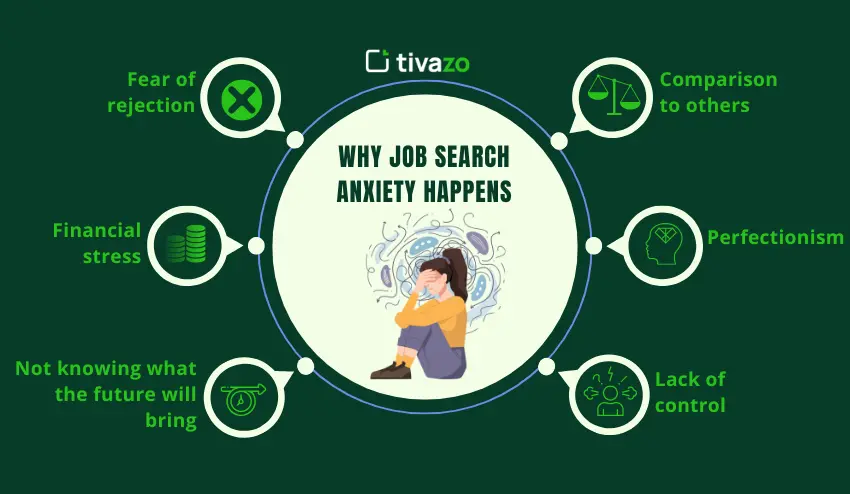
- Fear of rejection – Each rejection is a personal thing, even though it is not.
- Financial stress – Bills do not wait, and that is an added stress to the search.
- Not knowing what the future will bring – Uncertainty of the future can be overwhelming.
- Comparison to others – You can feel left out when you see your peers receiving offers on LinkedIn.
- Perfectionism – The idea that you should have a perfect resume, response or career path.
- Lack of control – The time of hiring, the response of the recruiter and the market conditions cannot be controlled.
Anxiety flourishes where the outcomes are perceived to be unpredictable. The greater the uncertainty, the greater the pressure. However, the positive thing is that when you know the underlying causes, you can deal with them using effective strategies.
How Job Search Anxiety Affects You
Job search anxiety is not only unpleasant but can affect your performance and well-being when not addressed. Knowing its effects can assist you in being proactive.
- Mental health effect- Constant anxiety may cause stress, irritation, or even depression.
- Lost confidence – Fear of rejection or comparisons may make you lose confidence in your abilities.
- Reduced efficiency – Excessive thinking of the applications or shying away of tasks will reduce your efficiency in the job search
- Bad judgment- Anxiety can make you take the first offer because of fear or even missing better opportunities.
- Physical symptoms -Sleeping problems, headaches, or exhaustion can be caused by constant stress.
The first step to controlling anxiety is recognizing these effects. By eliminating the causes and applying effective tactics, you will be able to avoid its sabotaging your job search and keep your focus and motivation intact.
Practical Tips to Overcome Job Search Anxiety
Job search anxiety is something that requires planning and attitude. These are some of the practical strategies and personal productivity tips you can begin using today:
- Set a Structured Time Table
- Set aside a certain time in a day to apply, network and follow up.
- Routine limits uncertainty and eliminates the stress of last-minute work.
- When you know what to work on every day, you are focused.
- Break Down into Smaller Steps
- Rather than trying to complete 10 applications simultaneously, complete one application at a time.
- Customize each cover letter and resume in small bits.
- Minor successes create a momentum and a gradual increase in confidence.
- Practice Self-Care on a Regular Basis
- Exercise, eat well and sleep regularly.
- Stress is reduced by mindfulness, meditation, or taking short breaks throughout the day.
- When you are rested, you can take rejections and delays in a better way.
- Comparisons to Others
- Do not compare yourself with the progress of others on LinkedIn or social media.
- Concentrate on your skills, accomplishments and development.
- It is important to remember that each career is individual and schedules vary.
- Find a Support and Mentor
- Share with friends, mentors, or job search groups.
- Having a conversation with a person who shares your pain gives you a different outlook.
- Mentors are able to provide guidance, whereas communities are able to offer encouragement and motivation.
- Be Well-prepared to Interview
- Look up the company, prepare answers to frequently asked questions, and do mock interviews.
- The better prepared you are, the less uncertain you will be.
- Preparation eliminates anxiety and enhances performance.
- Monitor Your Progress
- Maintain a record of applications made, replies received and interviews attended.
- Celebrate the little victories, such as making an application or getting a call.
- It is easier to visualize progress which makes the journey seem manageable and helps to reduce stress.
Mindset Shifts for Confidence
Your attitude is very important in dealing with job search anxiety. It can be possible to alter your thinking process, which will make the process less fearful and more liberating.
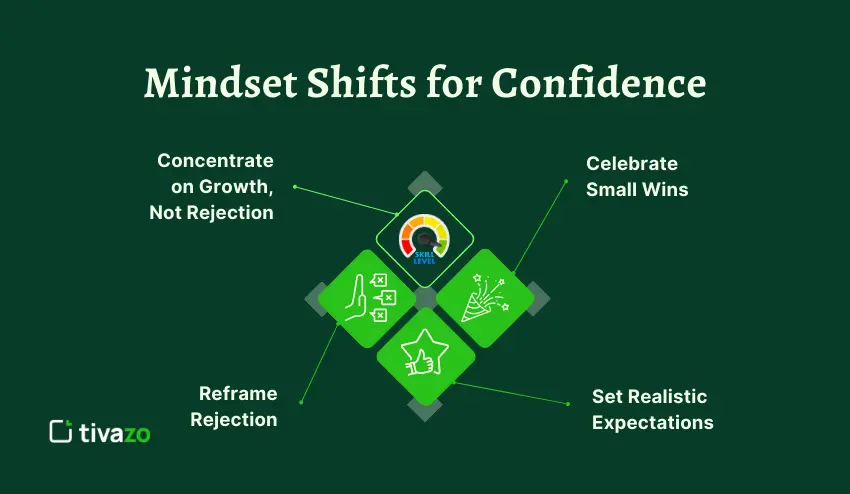
- Concentrate on Growth, Not Rejection
- Learn something new in each application or interview
- You will learn more about your weaknesses and strengths even when you do not get the job.
- Reframe Rejection
- It is not always about your value. It is usually a timing, fit or competition issue.
- See failure as a stepping stone to the right opportunity
- Celebrate Small Wins
- A well-written application, one interview, one new skill is progress.
- Rewarding performance makes you feel less anxious and more motivated.
- Set Realistic Expectations
- Remember that employment is a process and it takes time particularly in a competitive field.
- Take a break and have faith in the process.
When you change your attitude, you will be able to avoid stress, remain motivated and confident in all your applications.
Tools & Resources that Help
Finding the right tools can help keep your job search organized and make it a lot less stressful, and avoid having job search anxiety. Tools can help you track applications, help you prepare for interviews, and help you build skills.
- Job Board & Aggregator Sites
- There are sites like LinkedIn, Indeed, and Glassdoor that centralize job listings as well as notify you when new jobs are posted that match your search.
- By setting up notifications, they help to cut down the time you might spend manually searching for jobs and help keep you organized.
- Application Trackers
- Trello or Airtable can be used as an application tracker where you log jobs you have applied to, when interviews are, and follow-ups.
- Keeping a log provides clarification and prevents you from missing any application deadlines.
- Skill Development Sites
- Coursera, Udemy and LinkedIn Learning are all sites with many online courses that allow you to learn essential skills or other relevant skills while you are searching for work.
- Even if you are not learning technical skills, upskilling or reskilling will give you confidence and make you more marketable.
- Mock Interview Tools
- There are platforms like Pramp or Interviewing.io that you can use and practice by either interviewing peers or conducting an interview with professionals.
- Practicing and getting used to speaking with others helps to reduce anxiety and will help you in the actual interviews.
- Support Structures
- Support structures are essential to have in place besides family and friends. Online groups specifically, professional groups and mentors help provide the encouragement and guidance that are needed.
- Everyone is human and uncomfortable when they exit their comfort zone. Relating experiences, anxieties, fears and nerves helps normalize everything and provide tools to prepare.
After leveraging these tools & resources, you will remain organized, work on your skills and realize a feeling of control over your search for work, and most importantly, reduce your anxiety!
When to Seek a Professional
There are cases when the job search anxiety is more than mere stress and needs the attention of a professional. Learning more about these effects and seeking early treatment can help avoid the effects of addiction on future employment, health, and motivation.
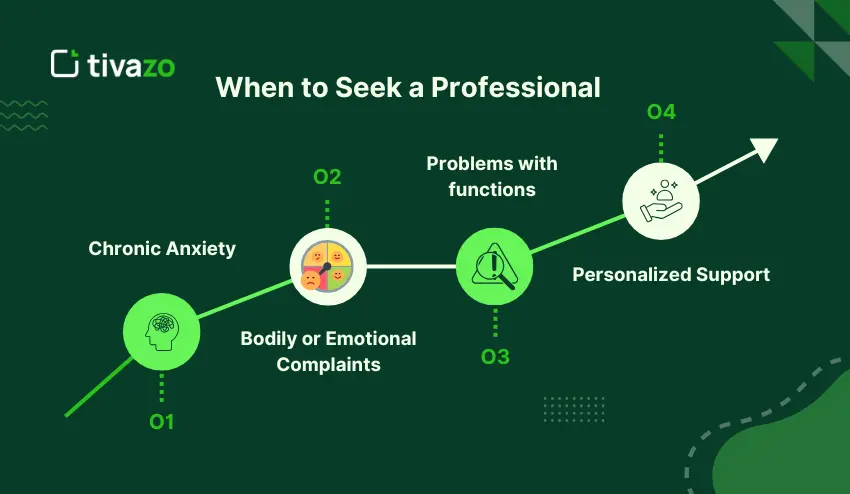
- Chronic Anxiety
When the fear of application procedures, interviews or rejection lasts weeks on end, as well as getting in the way of normal living, it is time to seek professional help. - Bodily or Emotional Complaints
Chronic insomnia, migraines, or an especially moody incessant attitude towards the job search batter are indicative of your need of help. - Problems with functions
A career coach or counselor can offer other strategies to manage anxiety that can help you feel confident and back in control with filling out applications, interviewing, and networking. - Personalized Support
A licensed psychologist, professional counselor, or career development counselor can help unearth the factors behind the problem, devise a solution, and increase your confidence.
Important to remember that going to a specialist is not a bad thing; it does not mean that you are weak. It provides you with the skills and means to overcome job search anxiety, whilst being able to concentrate on landing the perfect job.
Conclusion
It is common to experience job search anxiety, however, it will not have control over you if you understand why it happens, recognize the signs, and employ some practical strategies to help relieve your stress and stay focused.
First, establish a routine and structure your days. Second, break down the tasks that you must undertake to get your next job, into small manageable steps. Finally, prioritize self-care to keep a balanced life. Change your mindset to that of being an eternal student and learn from every rejection. Treat yourself to small celebrations along the way too!
Finally, using tools and your support system can keep you organized and remind you of the confidence you possess. Job search anxiety can be managed if you take the time to study and learn as you continue to search for a job and develop a sense of control in your job search journey.
